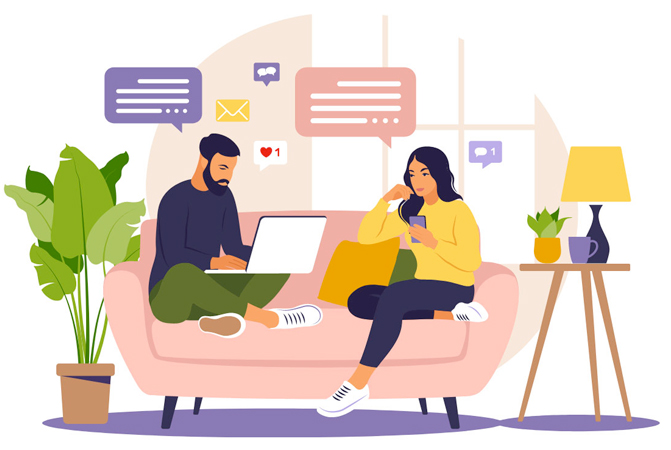
Fear of the pandemic
Adults are feeling a lot of stress due to the pandemic. It started with the lockdown in March 2020. You were told not to go out. You waited for someone to bring vegetables. Had to stretch the supplies. Sometimes you went to the shops and they were closed. The pressures that built up made us feel that we're living a 'chained' life. When we came back from the market, we had to wash everything that came - whether it was a packet or a bottle of milk. All surfaces in the house had to be wiped two times a day. It became a very suffocating kind of daily chore. Suffocating because you were scared if you had missed something. You're scared because everybody's saying it's in the air. This has no doubt affected the mental health of children too.

Intrusion into the home space
With school closures and work-from-home, most of the time parents are busy with office or house work, while the child is busy with their online classes. The common free time between the parent and child is now spent in helping the child with their studies. This leaves very little space for casual interactions — for example, on a “non-lesson issue” or for having a relaxed conversation. For the want of a better word, the “quality time” within the household has become stressed.
In other words the office and school spaces have intruded into the house. So, family members no longer have the excitement of coming home - "Ah! Mummy has come!" Or, "What are you going to cook today?" Or, "Now that Daddy has come, let's watch the show." Earlier, as a child, when you were back home from school, you could let your hair down and put your feet up and go “ta-da-ta-ra-da-ta-ta-ra.” Now the father will say “Quiet, I am talking to my boss.” There is a kind of atmospheric pressure. This intrusion into the home space has changed the texture of the home. More critically, it has affected the texture of parenting.
❝We can only equip children better – so that they use the technology, but are not getting ‘used’ by it.
Cybersecurity
With online learning, the time spent by children on gadgets and the internet has increased significantly. It has also increased the concerns over cybersecurity. Cyberspace gives children access to a world of their own. This autonomy gives them a space to experiment. It also brings in a sense of secrecy. Every child has his own computer or cell phone. And the web has become more sophisticated. Data can be used to track, profile, nudge, lure. You may just get trapped without even knowing it.
We cannot do away with technology. We can only equip children better – so that they use the technology, but are not getting “used” by it. We are talking about the need to revisit parenting lock, stock and barrel! Hence the need for dialogue between parents and children.
Need for conversations between parents and children
One of the things we need to do is have more dialogue with children. Stories and discussions based on stories can be very effective with younger children. They can be used to develop their ability to examine an action, the underlying triggers, whether it meets the principle of “greatest good for the greatest number.” We can change behaviors only when we get children to examine the motives and impact of their actions, and understand how their self-interest is inseparably connected to the interest of others. Developing such practices of self-examination will help address issues like character, family values, beliefs, some kind of decorum or culture in children.
❝Holidays should not be just you, your child and your husband …We need to bring back that safety net that is called community.
Expanding our sense of community
As things open up, we need to rethink the way we live and bond as a community. The more we isolate ourselves, the more our children are pushed into their own islands.
When I was young, my cousins would come and stay with us during the summer holidays. We made adjustments and made them welcome whether or not we liked everything about them. The breadth of interactions in your own family exposed you to different kinds of scenarios. I don't think that happens so much nowadays. Today, we go holidaying in exotic places. Holidays should not be just you, your child and your husband or wife. You should go with a couple of families with whom there are things in common. That creates space for discussions and doing things together.
When children are able to sit together with other adults and children, hear stories, observe others, it gives them an expanded picture of life. They learn how others deal with different situations even before they have to face them. They learn lessons of life by sharing other lives. As we emerge from the pandemic, we need to bring back that safety net that is called community.
